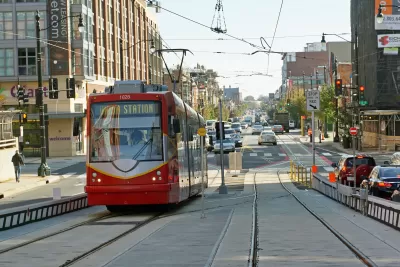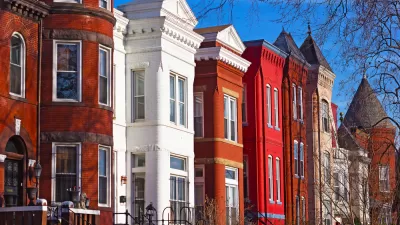New amendments to the D.C. Comprehensive Plan set goals for new housing development and fewer cars on the road.

Libby Solomon reports: "DC Council has been working for years to update the Comprehensive Plan, DC’s enormous zoning and land-use document. On Tuesday, those years of work concluded in a unanimous vote on an update to the document, which dates back to 2006."
Solomon helpfully notes that the approved amendments to the D.C. Comprehensive Plan don't change any zoning, but they will guide decisions about land use, zoning, and growth in the future.
And the amendments set the nation's capital decisively in the direction of more zoned capacity for development. In an article by Julia Zauzmer earlier this month, D.C. Planning Director Andrew Trueblood is quoted saying that the new amendments to the D.C. Comprehensive Plan would allow for as much as 15 percent more housing stock. Other innovative goals set by the update include plans to reduce the number of cars on the road and explore congestion pricing.
Solomon's coverage of the big comp plan update includes a discussion of the racial equity issues that played a central role in the political debate leading up to this week's vote. An April report from the Council Office of Racial Equity (CORE) faulted the plan amendments for failing to adequately address issues of racial equity. "Some of the last-minute changes the Council approved Tuesday were meant to address those concerns," according to Solomon. "One major change in Council Chairman Phil Mendelson’s Tuesday amendment to the bill: defining 'deeply affordable' housing as housing affordable to families making less than 40% of the Median Family Income (MFI)."
Solomon concludes by looking forward to next steps, with the amended comp plan only a first step toward achieving the goals laid out in the plan. With this update process now complete, Solomon reports that a full rewrite process will being in 2025.
FULL STORY: DC Council passes Comprehensive Plan update unanimously

Trump Administration Could Effectively End Housing Voucher Program
Federal officials are eyeing major cuts to the Section 8 program that helps millions of low-income households pay rent.

Planetizen Federal Action Tracker
A weekly monitor of how Trump’s orders and actions are impacting planners and planning in America.

Ken Jennings Launches Transit Web Series
The Jeopardy champ wants you to ride public transit.

Washington Legislature Passes Rent Increase Cap
A bill that caps rent increases at 7 percent plus inflation is headed to the governor’s desk.

From Planning to Action: How LA County Is Rethinking Climate Resilience
Chief Sustainability Officer Rita Kampalath outlines the County’s shift from planning to implementation in its climate resilience efforts, emphasizing cross-departmental coordination, updated recovery strategies, and the need for flexible funding.

New Mexico Aging Department Commits to Helping Seniors Age ‘In Place’ and ‘Autonomously’ in New Draft Plan
As New Mexico’s population of seniors continues to grow, the state’s aging department is proposing expanded initiatives to help seniors maintain their autonomy while also supporting family caregivers.
Urban Design for Planners 1: Software Tools
This six-course series explores essential urban design concepts using open source software and equips planners with the tools they need to participate fully in the urban design process.
Planning for Universal Design
Learn the tools for implementing Universal Design in planning regulations.
Heyer Gruel & Associates PA
Ada County Highway District
Institute for Housing and Urban Development Studies (IHS)
City of Grandview
Harvard GSD Executive Education
Toledo-Lucas County Plan Commissions
Salt Lake City
NYU Wagner Graduate School of Public Service





























